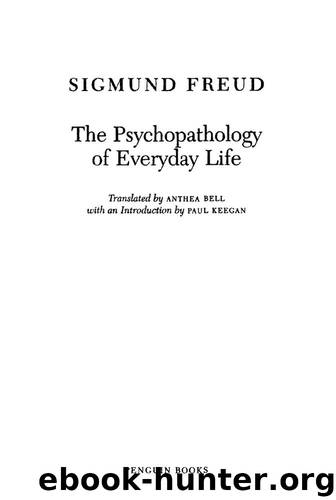The Psychopathology of Everyday Life (Penguin Classics) by Sigmund Freud

Author:Sigmund Freud [Freud, Sigmund]
Language: eng
Format: azw3, epub
ISBN: 9781101644782
Publisher: Penguin Publishing Group
Published: 2003-06-24T04:00:00+00:00
Wundt gives an interesting reason for the readily confirmed fact that we find it easier to commit slips of the pen than slips of the tongue (op. cit, p. 374). ‘In normal speech the inhibitory function of the will is constantly operating to reconcile the workings of the imagination with the process of articulation. If the movement of expression following on from ideas is slowed by mechanical causes, as in writing […] such anticipations will be especially likely to occur.’
Observation of the conditions in which mistakes in reading are made suggests a doubt which I would not like to leave unmentioned, since I believe that it can be the point of departure for a fruitful investigation. Everyone knows how often, when someone is reading aloud, the reader’s attention wanders away from the text and turns to his own thoughts. Quite often, and because of this inattention, he cannot say anything about the content of the text if he is interrupted and asked what it was. He has been reading almost automatically, but nearly always correctly. I do not believe that mistakes in reading are noticeably greater in such conditions. We are used to assuming that a whole series of other functions is meticulously but automatically performed, and little conscious attention is paid to them. It would seem to follow that whether or not one’s attention is alerted must, in the case of slips of the tongue, reading and writing, be determined in some way other than Wundt’s idea of the cessation or neglect of attention. The examples subjected to analysis have not really allowed the assumption of a quantitative decrease in attention; what we found, and it may not be quite the same thing, was the disruption of attention by another thought that emerged and claimed it.
Neglecting to add a signature should come somewhere between slips of the pen and ordinary forgetfulness. An unsigned cheque means a forgotten cheque. To illustrate the significance of such an omission I will cite a passage in a novel, which caught the attention of Dr H. Sachs:
‘There is a very clear and informative example of the creative writer’s sure touch in dealing with the psychoanalytic handling of slips and symptomatic actions in a novel by John Galsworthy, The Island Pharisees. The plot turns on the hesitation of a young man, a member of the rich bourgeoisie, between deep social sympathy and the conventions of his own class of society. Chapter XXVI describes his reaction to a letter from a young vagabond to whom he had given aid several times in the past, feeling drawn to his unconventional way of life. The young man’s letter does not contain any direct request for money, but describes a situation of great need which allows no other interpretation. At first its recipient rejects the idea of throwing money away on someone so incorrigible, rather than supporting charitable institutions.
‘To give a helping hand, a bit of himself, a nod of fellowship to any fellow being irrespective of a claim,
Download
The Psychopathology of Everyday Life (Penguin Classics) by Sigmund Freud.epub
This site does not store any files on its server. We only index and link to content provided by other sites. Please contact the content providers to delete copyright contents if any and email us, we'll remove relevant links or contents immediately.
Rewire Your Anxious Brain by Catherine M. Pittman(18625)
Talking to Strangers by Malcolm Gladwell(13334)
The Art of Thinking Clearly by Rolf Dobelli(10394)
Mindhunter: Inside the FBI's Elite Serial Crime Unit by John E. Douglas & Mark Olshaker(9301)
Becoming Supernatural by Dr. Joe Dispenza(8187)
Change Your Questions, Change Your Life by Marilee Adams(7720)
Nudge - Improving Decisions about Health, Wealth, and Happiness by Thaler Sunstein(7681)
The Road Less Traveled by M. Scott Peck(7576)
The Lost Art of Listening by Michael P. Nichols(7482)
Mastermind: How to Think Like Sherlock Holmes by Maria Konnikova(7306)
Enlightenment Now: The Case for Reason, Science, Humanism, and Progress by Steven Pinker(7292)
Win Bigly by Scott Adams(7175)
The Way of Zen by Alan W. Watts(6580)
Daring Greatly by Brene Brown(6492)
Big Magic: Creative Living Beyond Fear by Elizabeth Gilbert(5728)
Grit by Angela Duckworth(5580)
Ego Is the Enemy by Ryan Holiday(5395)
Men In Love by Nancy Friday(5219)
The Laws of Human Nature by Robert Greene(5139)
